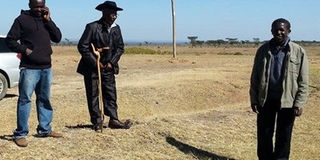DAD STORIES: The story of my father’s rough, scarred hand

Basillioh Mutahi with his grandfather Mutahi Rukanga and his father Joseph Rukanga in 2014. PHOTO | COURTESY
What you need to know:
- My father doesn’t talk much about that incident that left him scarred for life.
- Today, he suffers dull pains that linger on for long.
- Though painful, his scarred hand still oozes dedication, warmth, affection.
- Follow #DadStoriesKE for more stories like these or visit this Father's Day 2018 link.
The back of my father’s left palm is scarred. His fingers cannot straighten up well to form a wave; he cannot clap properly. At his best, they appear cusped.
However, both his hands have always been strong and rough – toiling away on the farm for years digging up the soil, picking coffee and carrying wheelbarrows of farm inputs and produce. It is how he managed to bring us up – the difficulty notwithstanding.
In my childhood, dad’s left hand – which has been scarred for longer than I have lived – fascinated us. Though rough, its touch soaked into me his determination and fatherly affection.
His hands served him and his young family well – but it’s only now, many years later, that we realise the pain and toll that his difficult past had taken on him and his left hand. Today, that hand is as rough and cupped as it has always been, but often he suffers dull pains that linger on for long.
That big scar that he sustained as a child has been a constant reminder of a painful past, and it has now come back even physically. It has also defined the sort of relationship he has with his father, my grandfather. And it trickles down to me.
But my father, Joseph Rukanga, doesn’t talk much about that incident that left him scarred for life.
I know less about it from him than I have heard from other people. Grandpa has occasionally talked about it, in a matter-of-fact way, in a bluntness characteristic of the village men of his generation—most of whom are no longer alive.
He blames the incident that scarred dad many moons ago for his painful predicament later in life. Grandpa has many tales he has told his grandchildren, and one of them is how dad had his childhood at the wrong time, at a time of war. So, dad grew up at a time of utter penury and confusion. It affected his health, his education and lot more.
At the time of the “State of Emergency” in the 1950s, grandpa recalls that colonialists rounded up and detained villagers across the ridges that surround the Tumu Tumu Hills in Nyeri, his birthplace, and elsewhere on the lands of their forefathers. Some were killed in that struggle for independence. Others survived in the forests as they waged a guerrilla warfare against the colonial masters.
The period was torturous for almost everyone, and certainly for a young household such as his. Dad was then very young, barely a toddler; and the troublesome period dragged on for years. He had only one sibling then, his sister, who was just a few years older than he, and also a child herself.
SHATTERED DREAMS
His mother (my grandmother, now deceased) was the only other member of the family living in the fortified village of Kamatu, the little colonial village at the foot of the Tumu Tumu where the womenfolk and the children were forced to live, surrounded by deep and precarious trenches that they had been made to dig themselves.
The villages were guarded mainly by armed home guards, their own men whom they regarded as betrayers in the fight for their independence. My grandfather had been detained far away from his home.
In the circumstances, there was very little to eat, as with the cruel swoop of the colonial masters, everyone had been forced to abandon their farms. Going back to the farm was restricted. Unga (maize flour), however, was available in the dukas, for a price.
But there is very little in terms of nutritional variety that you can get from unga. So for the lack of choice, gruel and “ngunja gutu” (I doubt there is an English or Kiswahili name for this yet) were the meals of necessity. Ngunja gutu is ugali, understandably mixed and cooked with anything else that is available, which could be bananas or green vegetables or potatoes or beans, really, anything else.
One day, dad was starving and he reached out for a pot of boiling gruel. It poured on him and he suffered serious burns. In the circumstance, there was no proper medical services and he nearly died.
Between dad and grandfather there is today an obligatory parent-child connection that is sometimes distant and only occasionally close. Many times it’s just there. There are underlying misgivings.
Dad still remembers the things he ought to have had in his childhood and youth, including the missed opportunity on education or get some training on a course of his choice. He feels bad about the incident that scarred him, that which grandpa says gave him no chance at the things he wanted.
Dad had a dream to do more than he did for us, but he blames grandpa for the predicament. He is embarrassed that he relies on his children at times for his upkeep, when he is now weak and ageing. With the pain on his hand, the scar still reminds him of his unfulfilled dreams.
To us, though, he did his work, and I see the fruition of his dreams in myself. I have a responsibility to him, just as I have to my daughter. It’s the essence of fatherhood, which I celebrate, the scars of the past notwithstanding.
Though painful, his scarred hand still oozes dedication, warmth, affection.
***
Follow #DadStoriesKE for more stories like these or visit this Father's Day 2018 link.





